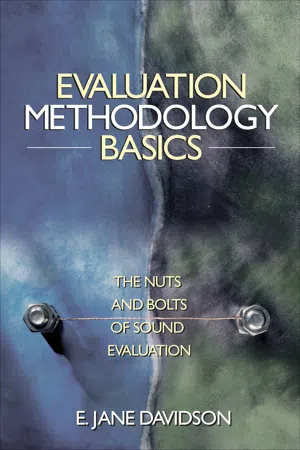
- 280 pages
- English
- PDF
- Available on iOS & Android
About this book
Click ?Additional Materials? for downloadable samples
"I welcome this student-friendly text to complement my favorite checklists. This text develops the core checklist framework to provide evaluation methodology basics for, presumably mainly, introductory courses on program evaluation."
—Colin Sharp, Evaluation Journal of Australasia
"What is evaluation-specific logic and methodology? This book answers that question in a way that is persuasive, accessible, and understandable. It presents a set of principles and procedures to guide the task of blending descriptive data with relevant values to draw explicitly evaluative conclusions. The book makes a significant contribution to positioning evaluation as a unique and special field of inquiry and judgment."
—Michael Quinn Patton, Union Institute and University
"Amidst the wash of methods books available to evaluators, Davidson?s book provides powerful techniques for asking and answering the important foundational questions in any program evaluation."
—Doug Leigh, Pepperdine University
"This is a very well written book that offers a unique perspective on long-practiced evaluation techniques and presents several new, potentially very useful, techniques that return "valuation" to the evaluation process."
—Greg Roberts, University of Texas, Austin
Evaluation theorists for years have advised evaluators to "take into account" all relevant values as part of an evaluation. But especially for the relatively new evaluator (even one who is knowledgeable and experienced in research methodology), there is not a lot of guidance about how this is done. Evaluation Methodology Basics: The Nuts and Bolts of Sound Evaluation provides a step-by-step guide for doing a real evaluation. It focuses on the main kinds of "big picture" questions that evaluators usually need to answer, and how the nature of such questions is linked to evaluation methodology choices. Jane Davidson explains how to combine a mix of qualitative and quantitative data with "relevant values" (such as needs) to draw explicitly evaluative conclusions.
Many students and evaluators find it difficult to visualize what evaluation logic and methodology "look like" in practice. To address this, Davidson presents readers with useful rubrics and flowcharts that may be used during each stage of the evaluation. Many of the concepts presented in the chapters are illustrated with specific examples from a range of disciplines. Exercises and "pop quiz" questions help reinforce the key points covered in each chapter, provide homework assignments for those teaching an evaluation course, and allow learners to develop slices of an evaluation plan as they work their way through the text.
Evaluation Methodology Basics is an ideal text for students of evaluation and students in programs that have evaluation course requirements, such as education, health, sociology, psychology, and many others throughout the social sciences. It will also be essential reading for practitioners who find themselves thrown into evaluation roles without the benefit of specialized evaluation training.
Frequently asked questions
- Essential is ideal for learners and professionals who enjoy exploring a wide range of subjects. Access the Essential Library with 800,000+ trusted titles and best-sellers across business, personal growth, and the humanities. Includes unlimited reading time and Standard Read Aloud voice.
- Complete: Perfect for advanced learners and researchers needing full, unrestricted access. Unlock 1.4M+ books across hundreds of subjects, including academic and specialized titles. The Complete Plan also includes advanced features like Premium Read Aloud and Research Assistant.
Please note we cannot support devices running on iOS 13 and Android 7 or earlier. Learn more about using the app.
Information
Table of contents
- EVALUATION METHODOLOGY BASICS- FRONT COVER
- EVALUATION METHODOLOGY BASICS
- COPYRIGHT
- CONTENTS
- PREFACE
- CHAPTER 1- WHAT IS EVALUATION?
- CHAPTER 2- DEFINING THE PURPOSE OF THE EVALUATION
- CHAPTER 3- IDENTIFYING EVALUATIVE CRITERIA
- CHAPTER 4- ORGANIZING THE CRITERIA AND IDENTIFYING POTENTIAL SOURCES OF EVIDENCE
- CHAPTER 5- DEALING WITH THE CAUSATION ISSUE
- CHAPTER 6- “VALUES” IN EVALUATION
- CHAPTER 7- DETERMINING IMPORTANCE
- CHAPTER 8- THE MERIT DETERMINATION STEP
- CHAPTER 9- SYNTHESIS METHODOLOGY
- CHAPTER 10- PUTTING IT ALL TOGETHER
- CHAPTER 11- META-EVALUATION
- ANSWERS TO SELECTED EXERCISES
- SAMPLE EXAM QUESTIONS
- GLOSSARY
- REFERENCES
- INDEX
- ABOUT THE AUTHOR